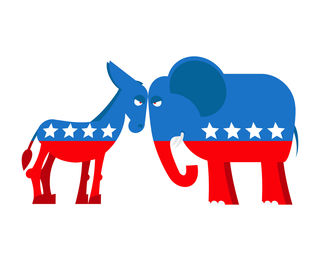Divorce
Today’s Political Polarization is Like High-Conflict Divorce
There are at least 7 close parallels in this “winner take all” decision-making.
Posted January 28, 2018
Six years ago, my colleague Don Saposnek, Ph. D., and I wrote a book titled SPLITTING AMERICA.1 The premise was that political polarization back then was increasingly like a high-conflict divorce. Looking back, the situation is even worse now, with the federal government shutting down last week with both sides blaming the other; anger (pro and con) over the Mueller investigation of the President’s campaign; and millions of dollars going into heated local special elections from both sides.

Here are some of the current comparisons:
1. Inexperienced Decision-Makers
Most reasonable people make their divorce decisions out of court in negotiations or mediation, but high-conflict divorces tend to end up in front of a judge. Family law judges are expected to have wisdom and a judicious temperament, but most do not start with experience in family law. In addition, two-thirds of judges do not start out with training in being a judge, although they have continuing education after they are on the bench. Likewise, most voters in political elections have no training in economics, criminology, business, management, government, leadership, knowledge of other countries, world history, etc.
2. Emotional He-Said-She-Said Decision-Making
In the absence of knowledge, simple emotional arguments about complex subjects and hard-to-prove private behavior become the focus of attention. The parties and their advocates (family lawyers or political advertisers) allege that the other party is the worst type of human being. In Family Court, high-conflict families line up against each other in what psychological researchers have long-termed “tribal warfare.”2 In politics, researchers have found that once voters pick a political party, their viewpoints rarely change from those of their “political tribe.”3 In both settings, the most extreme allegations are about inappropriate sexual behavior, which are sometimes true and sometimes false. But these usually increase the hostilities because the claims remain inconclusive. (However, this may be changing in politics with the full disclosures of the #MeToo movement).
3. There's No Consequence for Lying
I have never seen more lying than in Family Courts and in politics. In most of our daily lives this would not be tolerated, such as in families, in the workplace or in our communities. In Family Courts, the judge may weigh each party’s appearance of credibility in making decisions about parenting and finances, but very rarely makes a specific finding a party has lied and specifically punishes them for that. In politics, the voters may weigh each candidate’s appearance of credibility, but they just make their decisions and there’s no punishment for lying itself (and the side that “appears” most credible may be the side that lied the most).
4. Long, Drawn-Out Buildup to the Big Decisions
In Family Courts, trials often occur months or years after the parties separate, so that the buildup of anger, allegations and tug-of-war over the children just grows and grows. While there may be temporary decisions during this time, they are often made at very short hearings with little useful information. But these are public hearings, which escalate defensiveness and, therefore, increase the anger and allegations. In politics, the buildup to elections seems to be getting longer and longer, with months or years of campaign behavior in public with the 24-hour media, which escalates defensiveness and, therefore, increases the anger and allegations.
5. Big Decisions Make No Difference to Ongoing Polarization
In Family Courts, the big decisions (such as the day the divorce is granted) make no difference to the ongoing polarization in the family, as there can be ongoing court contests over parenting and support for months and years after the divorce. In politics, the actual election results make no difference to the ongoing polarization in the public, as elections can be contested or discredited, as new allegations are brought forth and the court of public opinion remains as divided as ever in the 24-hour news media.
6. Child Alienation and Voter Alienation
In Family Courts, as the case winds its way through the court process, parents become more and more afraid and angry, which spills over to the children who often cope by taking sides and learning to hate one of the parents and totally agree with the other parent. They refuse to see the rejected parent, as well as their grandparents on that side and even their pets at that parent’s house. In adulthood, many alienated children try to minimize contact with both parents after a high-conflict divorce. In politics, as the campaigns grind on, voters start to hate one of the candidates and everyone associated with them. In time, they may hate all politicians and many simply drop out of the electoral process and stop voting.
7. Adversarial Process (Winner Take All) Attracts Adversarial People (HCPs)
The common theme is a drawn-out, highly-adversarial, emotional process that potentially rewards the winner (often the most high-conflict person or “HCP”) with all the spoils. In Family Court, even though the judges and the law try to balance the outcome between the parties, in reality there is always the potential for one to win big or lose big regarding the children, support and property based on how bad each party can make the other look to the judge. Politics has a similar negative slant, with emotional decisions based primarily on expensive negative ads. Both processes increasingly attract those with high-conflict personalities, who have the endurance and skill for endlessly blaming others for months or years. As Don Saposnek and I wrote in 2012: “Thus, we have seen the shift from candidates who are skilled at politics, to candidates who are skilled at self-promotion and getting attention. In other words, bring on the narcissistic HCPs!”4
References
1. Eddy, B., & Saposnek, D. (2012). Splitting America: How Politicians, Super PACs and the News Media Mirror High Conflict Divorce. Scottsdale, AZ: High Conflict Institute Press.
2. Johnston, J., & Campbell, L. (1988). Impasses of Divorce: The Dynamics and Resolution of Family Conflict. New York, NY: The Free Press, 47.
3. Brooks, D. (2011). The Social Animal: The Hidden Sources of Love, Character and Achievement. New York, NY: Random House, 303.
4. Splitting America, above, at 66.


